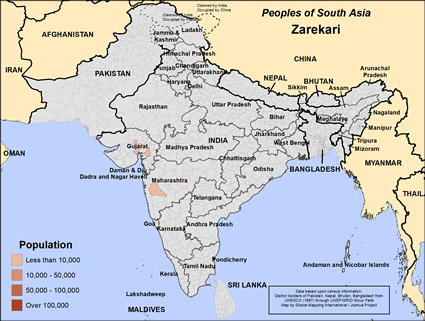Zarekari in India

Send Joshua Project a photo
of this people group. |

Map Source:
People Group data: Omid. Map geography: UNESCO / GMI. Map Design: Joshua Project
|
| People Name: | Zarekari |
| Country: | India |
| 10/40 Window: | Yes |
| Population: | 1,300 |
| World Population: | 1,300 |
| Primary Language: | Gujarati |
| Primary Religion: | Islam |
| Christian Adherents: | 0.00 % |
| Evangelicals: | 0.00 % |
| Scripture: | Complete Bible |
| Ministry Resources: | Yes |
| Jesus Film: | Yes |
| Audio Recordings: | Yes |
| People Cluster: | South Asia Muslim - other |
| Affinity Bloc: | South Asian Peoples |
| Progress Level: |
|
Introduction / History
The Zarekari people are a distinct ethnic group in India who primarily inhabit the southwestern states of Gujarat and Maharashtra, two states in western India. They speak mostly Gujarati, a key trade language in the state of Gujarat. They also speak Zarekari in Maharashtra, a language unique to the community that aligns with their cultural narratives and traditions.
What Are Their Lives Like?
The Zarekari culture thrives on a foundation of strong family bonds, agricultural activities, and artisanal crafts. Many Zarekari engage in farming by cultivating rice, wheat and vegetable crops. Artisans within the community excel in weaving, pottery and metalwork contributing to the local economy. They celebrate festivals and religious ceremonies with fervor.
What Are Their Beliefs?
The Zarekari people are Sunni Muslims. A Sunni Muslim is a label given to a group of Muslims to separate them into groups based on political purposes. The term "Sunni" is an Arabic word that means "laws" and comes from the word "sunnah," which means "way of life," referring to the way of life of the Prophet Mohammad which Muslims follow. Like most Muslims in India the Zarekari people have been affected by the syncretic influences of Hindu spirituality for hundreds of years.
What Are Their Needs?
The Zarekari people encounter significant challenges, including limited access to quality education and healthcare. Economic constraints and social marginalization hinder their progress. Additionally, the community faces the threat of cultural erosion due to external influences and modernization pressures. Outreach initiatives focusing on education and healthcare can significantly benefit the Zarekari community. Programs that support vocational training and economic development also empower individuals and families, fostering self-sufficiency. Building trust through culturally sensitive and respectful engagement will greatly enhance the effectiveness of Christian outreach efforts.
Prayer Points
Pray for the Lord to send out workers to the Zarekari people to help meet their physical, educational, vocational and spiritual needs.
Pray that the workers will find the person of peace within the community.
Ask God to give Zarekari a spiritual hunger that will lead them to embrace Jesus Christ no matter what the cost.
Pray for the Lord to bless them abundantly through discovery Bible studies that lead them to the only savior.
Pray for a Disciple Making Movement that will bless the Zarekari people.
Pray that the Lord will raise Zarekari leaders among the disciples to plant churches.